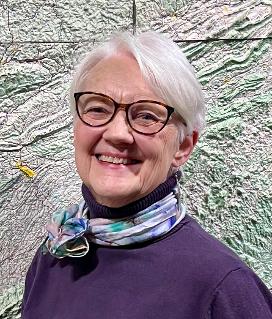Looking at a photograph of the first lamb of the season
The narrow stall recedes like Van Gogh’s room
in Arles. Where his single bed would be, a ewe,
well-muscled, dirty white, thrusts into the space
and stares us down –her flat face a wedge
between us and a slight, gray-mottled lamb
nearly hidden in the bedding straw.
Severe and filled with life, the tight expanse
swells and shrinks as if it breathed,
as if the heat in the ewe’s eye might sear,
as if everything important lay
within these wooden walls.
*
Old Short Tail
He stood in the dark cube of the stall
at the foot of the ladder to the loft
where I escaped to be with the sky,
in the odor of hay, the warm musk
of living cattle, dusty air
of ground corn feed —this steer
we called “Short-Tail,” the one
who’d be our hamburger come fall.
Each time I passed, I spoke to him,
caressed the broad expanse between his quiet eyes.
I loved the warm furred bone of that wide face,
sank my fingers into the shallow bowl of it.
What did I say to him? Something
like thank you, though no words could hold
the covenant we’d entered with this one—
chosen for our table—and I’m sorry
betrayed the dignity of his part
in what we shared. (None
of his half-brothers in the herd
were meant to survive, of course,
but we had less to do, we thought,
with their dying. We died, too,
we understood.) I took hold of the ladder’s rungs,
free to lift myself to the hay-strewn floor above.
I swung my legs out the open second-story door,
dreamed the lowering sun in the silence
of his huffing breath, the small sounds
of his hoofs on the dirt floor. On restless days,
muffled crashes as he flung his length
against plank walls, used his wide snout
to flip the water pail
off its hook. What he wanted
I was not at liberty to give.
At dusk I swung down and
stroked him goodbye. I stood
a moment longer than made sense,
walked through unfurling air
to find Mother penned between
sink and stove, her hair curling, damp
with supper’s steam.
*
*
Fitting

Leatha Kendrick is a poet, writer, editor and teacher. Her poems and essays appear widely in journals including Appalachian Journal, Hood of Bone, Rattle, Tar River Poetry, New Madrid Review, Southern Poetry Review, Appalachian Review, and Baltimore Review. Her writing has been collected in anthologies including Women Speak (vols. 8 & 9); The Kentucky Anthology; The Southern Poetry Anthology, Volume 3 (2nd. ed); I to I: Life Writing by Kentucky Feminists; and What Comes Down to Us – Twenty-Five Contemporary Kentucky Poets. Her fifth book of poetry is And Luckier (Accents Publishing, 2020). She has led workshops in memoir, poetry, fiction, and writing to heal at the Carnegie Center for Literacy and Learning in Lexington, Kentucky, and at colleges and conferences for more than three decades.
